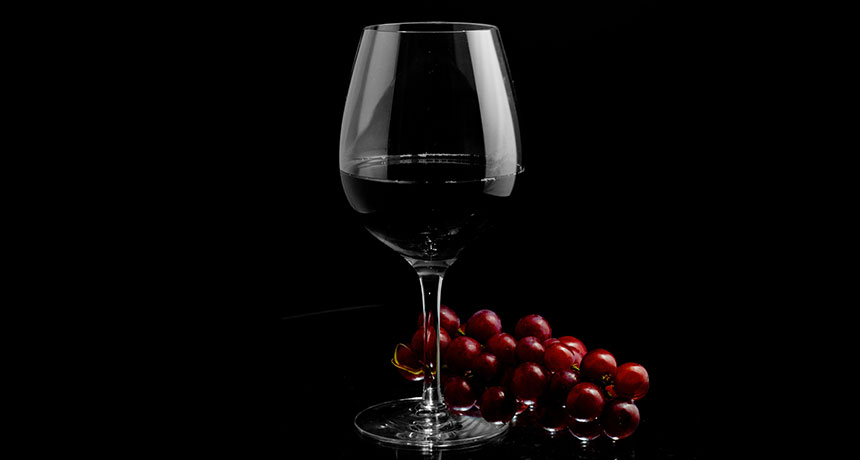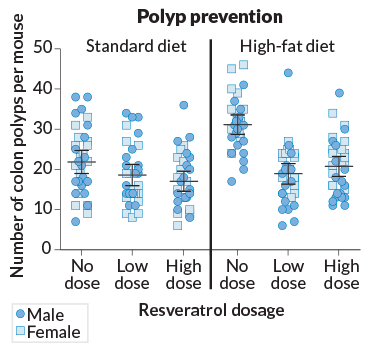Resveratrol’s anticancer benefits show up in low doses
Small amounts of the compound found in red wine and grapes prove protective against colon cancer in mice

A LITTLE DROP WILL DO YOU A little resveratrol may go a long way toward preventing colon cancer. Small doses of the chemical found in red wine and grapes may be better than big ones, researchers find. Researchers caution, however, against tippling: Alcohol in wine actually promotes colon cancer.
Jon/Flickr (CC BY-NC 2.0)
Less can be more.
Low doses of resveratrol, a chemical found in red grapes and some other foods, were better than higher ones at stimulating cancer-fighting processes, researchers report July 29 in Science Translational Medicine. Mice with a genetic predisposition for colon cancer also developed fewer tumors on a low dose of the drug than they did on a higher dose. The effect was noticeable when the mice ate a high-fat diet.
Researchers have long known that chemicals’ actions can vary widely at different doses (SN: 1/20/07, p. 40). But those findings haven’t percolated into most clinical studies of drugs or dietary nutrients, says John Pezzuto, a pharmaceutical scientist at Long Island University in New York. Researchers typically determine the maximum dose that people or animals can tolerate, then prescribe a slightly lower dose, he says.
“The assumption is that the higher the dose you can use without causing toxicity, the better,” Pezzuto says. But the new study suggests that “the best dose may not be the highest dose.”

She and her colleagues gave patients undergoing bowel surgery either 5 milligrams or 1 gram of resveratrol daily for a week before the operation. Five milligrams is at the high end of what people might get from foods, such as red wine, Brown says. Resveratrol was found in muscles and intestinal tissues of people taking both amounts, indicating that even at a lower dose, the chemical can get where it needs to go.
The team also worked with mice that have a mutation that causes colon cancer. High doses of resveratrol reduced the number of precancerous colon polyps by 22 percent in mice eating a standard diet but didn’t stop the rodents from developing tumors. Low doses had no effect.
Results changed when mice were fed a high-fat diet. Mice given a high dose of resveratrol (14 milligrams per kilogram of body weight) developed a third fewer polyps and 25 percent fewer tumors than mice that didn’t take the drug. Low-dose mice (0.07 milligrams per kilogram of body weight) fared even better: They had 40 percent fewer polyps and 52 percent fewer tumors.
Such low doses — less than the 5 milligrams given to people — aren’t expected to have any effects, so the result is a pleasant and important surprise, Pezzuto says. But he’s skeptical that the result shows a big advantage for low doses. “Statistically, they are showing an effect, but in my view there’s not that much difference,” he says. Still, “it would be better to use a low dose if you don’t have to use a high dose.”
In mice and people, low resveratrol doses were also better at stimulating biological processes that may prevent cancer. Higher doses had the opposite effect. Perhaps too much resveratrol triggers others processes that inhibit its beneficial actions, Brown speculates.
These dosage implications may extend to other nutrients reported to fight cancer, the researchers write. Beta-carotene, vitamins C and E, and the nutrient selenium have all failed in clinical trials of their cancer-fighting abilities, mystifying scientists about why such promising chemicals don’t live up to expectations. After all, says Brown, “these compounds come to our attention from epidemiological studies that show that populations that consume foods containing these compounds have a lower incidence of cancer.”
Her results suggest the failure may have been in giving too much of a good thing, she says.







